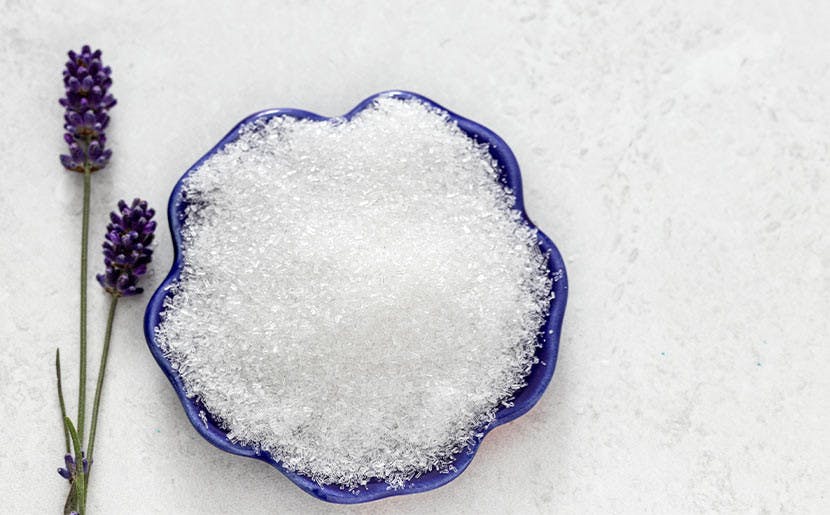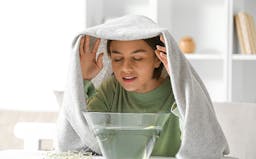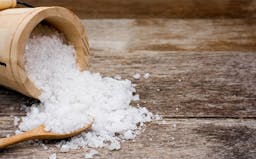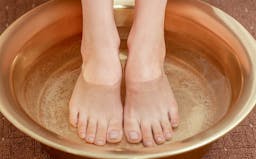Who Needs an Epsom Salt Bath? It Could Be You!
Article by:
Tammie Burak |
6 min read
What is an Epsom salt bath? Epsom salt is a white salt-like crystal that some people add to bath water to treat skin problems, muscle pain, insomnia, and other complaints. The secret of its effectiveness as a natural remedy lies in what it’s made of.
Epsom salt is composed of magnesium, sulfur, and oxygen, naturally occurring chemicals that serve many functions in living organisms. The chemical work done by our cells, called metabolism, is what keeps us alive, allows us to grow and reproduce, adjust to our environment and do the daily repair work necessary for good health. Our cells need the minerals in epsom salt to do this work, so let’s take a closer look at them.
Magnesium
Your body uses magnesium to:
- Build bones and teeth1
- Assist in energy production inside cells2
- Facilitate transmission of nerve impulses3
- Relax muscle4
- Synthesize and metabolize vitamin D.5
About half the magnesium in the body is found in bone and half in muscle and soft tissues. It is an essential mineral, yet three out of four Americans don’t get enough magnesium from their diets. In addition, certain lifestyle factors like alcohol consumption and the use of diuretics (substances such as coffee) cause a depletion of magnesium.6 These factors are reason for concern. It’s likely that many of us have symptoms of magnesium deficiency and don’t even know it.
Low Magnesium Symptoms
Although magnesium levels in the blood vary slightly and may not clearly identify a deficiency, having a blood test to determine magnesium levels can be helpful in monitoring treatment. Ask your doctor to include a magnesium test and ask about magnesium deficiency and treatment options. Symptoms of magnesium deficiency may include:7
- Fatigue
- Seizures
- Numbness
- Abnormal heart rhythm
- Restless leg syndrome (RLS)
- Sleep disorders
- Irritability
- Confusion
- Muscle spasm and weakness
- Poor nail growth/health
- Seizures

A study found that adults aged 20-75 years in the Netherlands who had less magnesium in the urine, signifying a diet low in magnesium, were at higher risk of heart disease. A diet higher in magnesium intake was associated with lower risk of ischemic heart disease which is caused by a reduced blood supply to the heart muscle.8
Other studies suggest that diets high in magnesium
- might reduce the risk of stroke,
- are associated with a significantly lower risk of diabetes,
- might increase bone mineral density in postmenopausal and elderly women, and
- can help prevent migraine headaches.
Good sources of dietary magnesium include:
- Almonds
- Beans and lentils
- Brazil nuts
- Cashews
- Flax seeds
- Pumpkin and squash seeds
- Quinoa and other whole grains
- Sesame seeds
- Spinach
Sulfur in the Body
The other component of Epsom salt is sulfate. Researcher Stephanie Seneff says, “Sulfur is known as a healing mineral, and a sulfur deficiency often leads to pain and inflammation associated with various muscle and skeletal disorders.”9 She believes that modern farming practices and lifestyle habits like the use of sunscreen has led to sulfate deficiency and may be linked to such problems as obesity and heart disease.
Sulfur:
- plays an important role in metabolism.
- is present in insulin, an important blood-sugar regulator
- is used in the production of vitamin D from sunlight
Epsom salt bath and blood levels of magnesium and sulfate
A study tested the ability of skin to absorb magnesium and sulfate from Epsom salt in bath water. Both blood levels and urine levels of magnesium and sulfate increased as a result of bathing in Epsom salt dissolved in bath water.10 Researchers concluded that magnesium sulfate is absorbed through the skin.

However, a different study stressed that more research is needed before transdermal magnesium absorption proves an acceptable means of achieving adequate magnesium levels. In cases of magnesium deficiency, oral magnesium supplementation has so far been proven more beneficial than magnesium applied to the skin.11
Medically, magnesium sulfate is used to:
- prevent cerebral palsy resulting from pre-term birth12
- prevent death due to eclampsia, a complication causing seizures, in pregnant women13
- treat heart arrhythmia
- treat severe asthma
- delay preterm birth by relaxing uterine muscle contraction.
Using Epsom Salt at Home
Since most of us are not getting enough magnesium from our foods, it’s a good idea to eat more foods high in magnesium. If you grow your own food, you can increase the magnesium content of fruits and vegetables by adding Epsom salt to the base of the plants or adding it to the soil at planting time.

Internal Use of Magnesium Sulfate
Do not use Epsom salt or magnesium sulfate supplements internally without the advice of your physician as several types of medications can interact with magnesium supplements or affect magnesium levels in the blood. Also, an overdose of magnesium sulfate can be fatal.
In the Bath
It’s unlikely that you could absorb a dangerous amount of magnesium sulfate from bathing. Bathing in water with dissolved Epsom salt is generally safe, and may increase magnesium and sulfate levels in the body. Add one or two cups of Epsom salt to your bath (or follow package instructions) to ease tension, relieve sore muscles and help you relax before going to bed.
Epsom salt and autism
Parents of children with autism or ADHD report benefits for children given Epsom salt baths. It is thought that the sulfate supplied through the skin improves neurotransmitter function, helping children to feel calmer.
These statements have not been evaluated by the Food and Drug Administration or Health Canada. Our articles, videos and products are not intended to diagnose, treat, cure, or prevent any disease. If you are pregnant, nursing, taking medication, or have a medical condition, consult your physician before following any recommendations or using any product on our site. You assume sole responsibility for your personal health, and you must use your own discretion under doctor consultation to determine whether any product or recommendation on this site is suitable for your personal situation.








